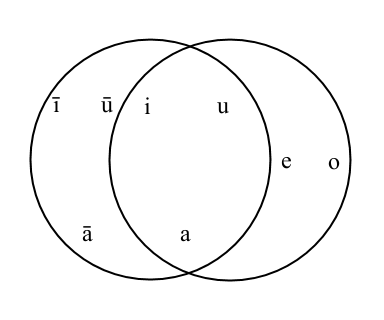|
Robert T. Harms
Robert Thomas Harms (1932 – October 5, 2016) was an American linguist and emeritus professor of linguistics at University of Texas at Austin. He is known for his research on grammar of Estonian and phonological theory. Books * ''Introduction to Phonological Theory'', 1968 * ''Estonian Grammar'', 1962 * ''Finnish Structural Sketch'', 1964 References Phoneticians University of Texas at Austin faculty 1932 births Communication scholars Phonologists from the United States University of Chicago alumni Linguists of Finnish Linguists of Estonian 2016 deaths {{Estonia-academic-bio-stub ... [...More Info...] [...Related Items...] OR: [Wikipedia] [Google] [Baidu] |
University Of Chicago
The University of Chicago (UChicago, Chicago, U of C, or UChi) is a private research university in Chicago, Illinois. Its main campus is located in Chicago's Hyde Park neighborhood. The University of Chicago is consistently ranked among the best universities in the world and it is among the most selective in the United States. The university is composed of an undergraduate college and five graduate research divisions, which contain all of the university's graduate programs and interdisciplinary committees. Chicago has eight professional schools: the Law School, the Booth School of Business, the Pritzker School of Medicine, the Crown Family School of Social Work, Policy, and Practice, the Harris School of Public Policy, the Divinity School, the Graham School of Continuing Liberal and Professional Studies, and the Pritzker School of Molecular Engineering. The university has additional campuses and centers in London, Paris, Beijing, Delhi, and Hong Kong, as well as in downtown ... [...More Info...] [...Related Items...] OR: [Wikipedia] [Google] [Baidu] |
Phonology
Phonology is the branch of linguistics that studies how languages or dialects systematically organize their sounds or, for sign languages, their constituent parts of signs. The term can also refer specifically to the sound or sign system of a particular language variety. At one time, the study of phonology related only to the study of the systems of phonemes in spoken languages, but may now relate to any linguistic analysis either: Sign languages have a phonological system equivalent to the system of sounds in spoken languages. The building blocks of signs are specifications for movement, location, and handshape. At first, a separate terminology was used for the study of sign phonology ('chereme' instead of 'phoneme', etc.), but the concepts are now considered to apply universally to all human languages. Terminology The word 'phonology' (as in 'phonology of English') can refer either to the field of study or to the phonological system of a given language. This is one of th ... [...More Info...] [...Related Items...] OR: [Wikipedia] [Google] [Baidu] |
University Of Texas At Austin
The University of Texas at Austin (UT Austin, UT, or Texas) is a public research university in Austin, Texas. It was founded in 1883 and is the oldest institution in the University of Texas System. With 40,916 undergraduate students, 11,075 graduate students and 3,133 teaching faculty as of Fall 2021, it is also the largest institution in the system. It is ranked among the top universities in the world by major college and university rankings, and admission to its programs is considered highly selective. UT Austin is considered one of the United States's Public Ivies. The university is a major center for academic research, with research expenditures totaling $679.8 million for fiscal year 2018. It joined the Association of American Universities in 1929. The university houses seven museums and seventeen libraries, including the LBJ Presidential Library and the Blanton Museum of Art, and operates various auxiliary research facilities, such as the J. J. Pickle Research Ca ... [...More Info...] [...Related Items...] OR: [Wikipedia] [Google] [Baidu] |
Linguistics
Linguistics is the scientific study of human language. It is called a scientific study because it entails a comprehensive, systematic, objective, and precise analysis of all aspects of language, particularly its nature and structure. Linguistics is concerned with both the cognitive and social aspects of language. It is considered a scientific field as well as an academic discipline; it has been classified as a social science, natural science, cognitive science,Thagard, PaulCognitive Science, The Stanford Encyclopedia of Philosophy (Fall 2008 Edition), Edward N. Zalta (ed.). or part of the humanities. Traditional areas of linguistic analysis correspond to phenomena found in human linguistic systems, such as syntax (rules governing the structure of sentences); semantics (meaning); morphology (structure of words); phonetics (speech sounds and equivalent gestures in sign languages); phonology (the abstract sound system of a particular language); and pragmatics (how social con ... [...More Info...] [...Related Items...] OR: [Wikipedia] [Google] [Baidu] |
Linguistic Society Of America
The Linguistic Society of America (LSA) is a learned society for the field of linguistics. Founded in New York City in 1924, the LSA works to promote the scientific study of language. The society publishes three scholarly journals: ''Language'', the open access journal ''Semantics and Pragmatics'', and the open access journal Phonological Data & Analysis. Its annual meetings, held every winter, foster discussion amongst its members through the presentation of peer-reviewed research, as well as conducting official business of the society. Since 1928, the LSA has offered training to linguists through courses held at its biennial Linguistic Institutes held in the summer. The LSA and its 3,600 members work to raise awareness of linguistic issues with the public and contribute to policy debates on issues including bilingual education and the preservation of endangered languages. History The Linguistic Society of America (LSA) was founded on 28 December 1924, when about 75 linguists ... [...More Info...] [...Related Items...] OR: [Wikipedia] [Google] [Baidu] |
Grammar Of Estonian
Estonian grammar is the grammar of the Estonian language. Grammatical processes Consonant gradation Estonian consonant gradation is a grammatical process that affects obstruent consonants at the end of the stressed syllable of a word. Gradation causes consonants in a word to alternate between two ''grades'', termed "strong" and "weak", depending on the grammar. Some grammatical forms trigger the weak grade, while others retain the strong grade. It is not predictable which form will have which grade; this must simply be memorised. Not all words show gradation. In particular, words with stems of three or more syllables generally do not gradate, nor do words with stems of one syllable. Gradation correlates with the appearance of extra length on a syllable. When a syllable is long, the strong grade will always be accompanied by extra length. The weak grade may or may not have extra length, depending on other factors. These are mentioned at Estonian phonology – Suprasegmental ... [...More Info...] [...Related Items...] OR: [Wikipedia] [Google] [Baidu] |
Phonological Theory
Phonology is the branch of linguistics that studies how languages or dialects systematically organize their sounds or, for sign languages, their constituent parts of signs. The term can also refer specifically to the sound or sign system of a particular language variety. At one time, the study of phonology related only to the study of the systems of phonemes in spoken languages, but may now relate to any linguistic analysis either: Sign languages have a phonological system equivalent to the system of sounds in spoken languages. The building blocks of signs are specifications for movement, location, and handshape. At first, a separate terminology was used for the study of sign phonology ('chereme' instead of 'phoneme', etc.), but the concepts are now considered to apply universally to all human languages. Terminology The word 'phonology' (as in 'phonology of English') can refer either to the field of study or to the phonological system of a given language. This is on ... [...More Info...] [...Related Items...] OR: [Wikipedia] [Google] [Baidu] |
Phoneticians
Phonetics is a branch of linguistics that studies how humans produce and perceive sounds, or in the case of sign languages, the equivalent aspects of sign. Linguists who specialize in studying the physical properties of speech are phoneticians. The field of phonetics is traditionally divided into three sub-disciplines based on the research questions involved such as how humans plan and execute movements to produce speech (articulatory phonetics), how various movements affect the properties of the resulting sound (acoustic phonetics), or how humans convert sound waves to linguistic information (auditory phonetics). Traditionally, the minimal linguistic unit of phonetics is the phone—a speech sound in a language which differs from the phonological unit of phoneme; the phoneme is an abstract categorization of phones. Phonetics deals with two aspects of human speech: production—the ways humans make sounds—and perception—the way speech is understood. The communicative modali ... [...More Info...] [...Related Items...] OR: [Wikipedia] [Google] [Baidu] |
University Of Texas At Austin Faculty
A university () is an institution of higher (or tertiary) education and research which awards academic degrees in several academic disciplines. Universities typically offer both undergraduate and postgraduate programs. In the United States, the designation is reserved for colleges that have a graduate school. The word ''university'' is derived from the Latin ''universitas magistrorum et scholarium'', which roughly means "community of teachers and scholars". The first universities were created in Europe by Catholic Church monks. The University of Bologna (''Università di Bologna''), founded in 1088, is the first university in the sense of: *Being a high degree-awarding institute. *Having independence from the ecclesiastic schools, although conducted by both clergy and non-clergy. *Using the word ''universitas'' (which was coined at its foundation). *Issuing secular and non-secular degrees: grammar, rhetoric, logic, theology, canon law, notarial law.Hunt Janin: "The university ... [...More Info...] [...Related Items...] OR: [Wikipedia] [Google] [Baidu] |
1932 Births
Year 193 ( CXCIII) was a common year starting on Monday (link will display the full calendar) of the Julian calendar. At the time, it was known as the Year of the Consulship of Sosius and Ericius (or, less frequently, year 946 ''Ab urbe condita''). The denomination 193 for this year has been used since the early medieval period, when the Anno Domini calendar era became the prevalent method in Europe for naming years. Events By place Roman Empire * January 1 – Year of the Five Emperors: The Roman Senate chooses Publius Helvius Pertinax, against his will, to succeed the late Commodus as Emperor. Pertinax is forced to reorganize the handling of finances, which were wrecked under Commodus, to reestablish discipline in the Roman army, and to suspend the food programs established by Trajan, provoking the ire of the Praetorian Guard. * March 28 – Pertinax is assassinated by members of the Praetorian Guard, who storm the imperial palace. The Empire is auctioned off ... [...More Info...] [...Related Items...] OR: [Wikipedia] [Google] [Baidu] |
Communication Scholars
Communication (from la, communicare, meaning "to share" or "to be in relation with") is usually defined as the transmission of information. The term may also refer to the message communicated through such transmissions or the field of inquiry studying them. There are many disagreements about its precise definition. John Peters argues that the difficulty of defining communication emerges from the fact that communication is both a universal phenomenon and a specific discipline of institutional academic study. One definitional strategy involves limiting what can be included in the category of communication (for example, requiring a "conscious intent" to persuade). By this logic, one possible definition of communication is the act of developing meaning among entities or groups through the use of sufficiently mutually understood signs, symbols, and semiotic conventions. An important distinction is between verbal communication, which happens through the use of a language, and non ... [...More Info...] [...Related Items...] OR: [Wikipedia] [Google] [Baidu] |



.jpg)

